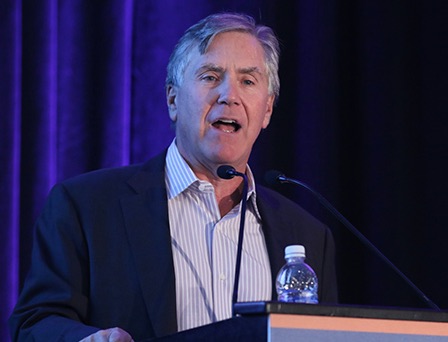The Five Spot: Mark Greenberg

The smarter way to stay on top of broadcasting and cable industry. Sign up below
You are now subscribed
Your newsletter sign-up was successful
Mark Greenberg can let out a giant sigh of relief and continue plotting the premium cable channel’s evolution. On Nov. 17, Epix ordered second seasons of political satire Graves and spy thriller Berlin Station, a major endorsement of a strategy centered on injecting the network into the quality scripted series discussion.
Epix, a seven-year-old partnership of Lionsgate, MGM Studios and Paramount, also debuted docuseries America Divided this fall. The executive producers were an unlikely, but no less holy, trinity: Shonda Rhimes, Norman Lear and Common.
Next up is Get Shorty, an adaptation of the book and film that features Ray Romano and Chris O’Dowd in the cast.
Greenberg, who spent nearly 25 years as an exec at Showtime and HBO, recently re-upped at Epix. He sees the calendar year offering three main programming seasons and would like to feature at least two originals in each. “It’s one step at a time,” he says. “But I think we’ve taken a positive first step.”
Greenberg spoke with Michael Malone, B&C deputy editor. An edited transcript follows.
Epix tried an original series, Tough Trade, back in 2010. Why did the shows work this time and not six years ago? Six years ago, we had less distribution—I’m not sure it would’ve worked even if the show was great. I don’t know that we got to shape it as much, or really collaborate on where it should go. We were able to work from the ground up on [Graves and Berlin Station] and that made a difference. We’re big believers that you need a great script. Not a good script—a great script. We looked at a ton of intellectual property; we were really discerning about what was there. And I think we got a little lucky on Graves with the recent political situation, and life imitating the art. We are taking on issues that are still being discussed post-election.
Why is Get Shorty right for Epix? First off, Elmore Leonard is a phenomenal writer. The book is extraordinary, and it became a fascinating movie with a cult following. Like what MGM did with Fargo, making it more contemporary, we’ll make some shifts with Get Shorty. It will be a premium show—it will have its uniqueness, its voice, and the authenticity with which Elmore wrote it. That doesn’t mean the show [is a hit]. We have lot of work to do over the next several months to make sure the show is as brilliant as we hope it will be.
The smarter way to stay on top of broadcasting and cable industry. Sign up below
How do you measure success for originals? Ratings and reviews and subs? A combination of all the above. We do our own consumer research. We did sampling earlier, and had huge numbers on digital. When we looked at premiere night (Oct. 16), it performed as well as one of our big movies. (Note: Epix did not divulge ratings for the two series.) Over the following weeks, it held pretty consistently. We had awesome reviews, a great launch, great sampling. Then when we did research with consumers, [the shows] got universally great feedback. We use our own judgement too.
Will you bring back America Divided? Given what we’ve all experienced the last [few weeks], it’s probably a more relevant docuseries. I’m hopeful we’ll continue that. We’ll have discussions with them. If we can pick the right subject matter, we would seriously consider renewing it. Those guys did a great job, took on some tough subject matter. I think we need to do a little more about America [being] divided. We did a good job on outcomes of the divide, but maybe need to understand what goes on in the divide.
Are there too many good TV shows? Do you think there are too many good books? Look, I never think there’s too much of a good thing. I do believe people will find good shows. If they’re not good, they’ll go away.
Michael Malone is content director at B+C and Multichannel News. He joined B+C in 2005 and has covered network programming, including entertainment, news and sports on broadcast, cable and streaming; and local broadcast television, including writing the "Local News Close-Up" market profiles. He also hosted the podcasts "Busted Pilot" and "Series Business." His journalism has also appeared in The New York Times, The L.A. Times, The Boston Globe and New York magazine.

